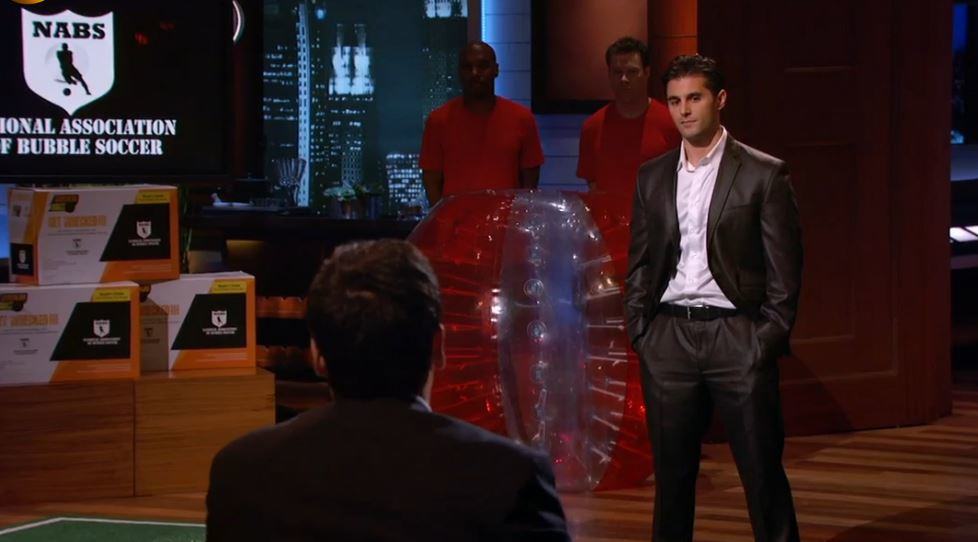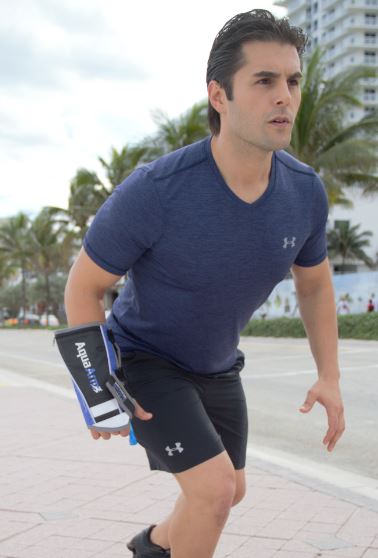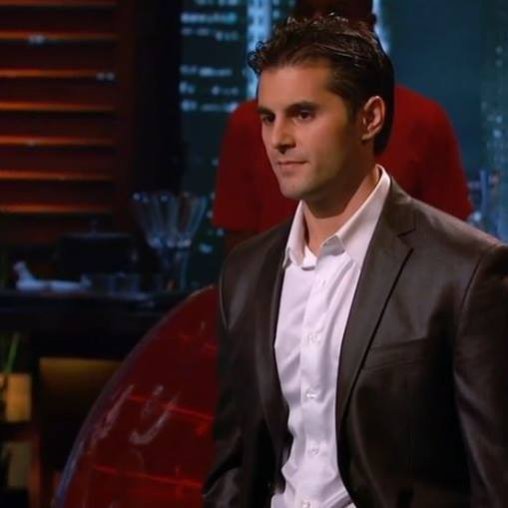John Radosta, CEO of Advanced Sports Technology Interview
Shark Tank is one of the hit TV shows on air today. Entrepreneurial hopefuls stand up in front of investors aka ‘sharks’ worth millions and billions of dollars to talk about their business. We had the opportunity to sit down with a recent Shark Tank hopeful to learn all about his experience in front of the sharks. Meet John Radosta, owner of Advanced Sports Technology who pitched his new form of a very popular sport. Learn about his journey and get an inside look at ABC’s Shark Tank.
This or That:
Shark Tank or The Profit:
I’m partial to Shark Tank for giving me an opportunity.
Beach or Ski Vacation:
Oh, lawdy…beach. I moved to Florida because I couldn’t stand the snow anymore!
Comedy or Thriller Movie:
Comedy, I love to laugh.
Chocolate or Peanut Butter Ice Cream:
I’m not an “either- or” kind of guy on this one, one scoop of both please lol
9-5 Job Life or Entrepreneur Life:
Oh, entrepreneur life, 100%. I’d rather work 18 hours a day as an entrepreneur than 5 hours a day as an employee. It’s the hardest but most rewarding thing you’ll ever do besides having kids. You learn so much.

Q&A with John Radosta:
When did you realize you wanted to be an entrepreneur?
I remember telling my parents when I was starting college that I didn’t want to get a job in corporate because I was an entrepreneur at heart. Later on in my career, I was also lucky enough to work for a series of horrible companies and got fired from each one (I know, how’s that perspective? I was lucky to get fired). At the time it didn’t seem so lucky, but in hindsight it was, because I’ve grown ten times as fast as a businessman in all areas than I ever would have working for any of them.
We know you were on season 7 of ABC’s Shark Tank to pitch Bubble Soccer. What made you decide to go on Shark Tank?
Well, I saw there was an open casting call in Miami and since I lived in Fort Lauderdale, I figured I’d go give it a shot. The audition was an absolute madhouse, but really entertaining. I got to meet some really interesting people with great ideas. I also saw some absolute nut jobs that I was like “oh my God, what you’re pitching carrying around that giant thing.” But then again, when I told people about bubble soccer I’m sure they thought I was a lunatic, lol.
Who is your favorite shark?
Well they’ve all got some great qualities and they all started from nothing. I watched a lot of lectures of theirs on YouTube and they’re all pretty fascinating. Kevin is a pretty cool dude actually, he was fired from an ice cream shop when he was younger and it still left a mark on him, just like it did for me, so I can understand his desire to win at all times. Same goes for Mark, he was fired for picking up a check from a customer instead of sweeping out the store like his boss told him, so he grabbed the opportunity for entrepreneurship and ran with it. Daymond was flat-out broke and used that as motivation. It’s hard to not have a respect for all of them and what they’ve been through. They’ve walked the same rocky path that I am walking right now. I tip my hat to anyone who’s been through it.
Name two qualities someone must have in order to be successful in getting on Shark Tank?
If you want to get on Shark Tank, you need to be able to not think like an entrepreneur for a minute and put yourself in the shoes of the casting producers. When I auditioned, people were there waiting from 6am until about 6 or 7pm at night. The producers have to sit through every single pitch, around 2,000-3,000 pitches a day. If you had to sit through 2,000-3,000 sales people pitching you their products, how would you feel? Probably slightly annoyed, bored, tired, and hungry. If you aim your pitch to cure as many of those things as possible for the producer you’re standing in front of, that makes you memorable.
For my pitch, I focused on making sure I did a few things ̶ make it entertaining, make it memorable, be quick, and show proof. The first thing I said didn’t even have anything to do with my product, I said “hey man, I know you have a lot of these pitches to sit through, so I’m not going to stand here and chew your ear off. I’ll be real quick just so you get the point, sound good?” That disqualifying statement shows the producer that you understand their current predicament, and opens their ears more sensitively to what you’re about to say.
I brought my iPad and showed them an action video while I talked quickly. I then dropped my income statement and balance sheet on the table so they could see proof that the business was making money. I’d be willing to bet I was one of the only entrepreneurs that day that brought their financial statements. Again, be memorable.
Remember, the producers are looking to put people on the show who they feel will make for entertaining television and who have the best chance of getting a deal. So if you’re pre-revenue, I think you’re at a significant disadvantage going up against other entrepreneurs who have proof-of-concept through sales.
They want the best entrepreneurs possible to put in front of the Sharks. You won’t see people trying to install a chip in your head for better cell phone reception or trying to create a hurricane machine just for giggles anymore, the show has gotten a lot more serious and the competition has scaled up dramatically.
If you had to do it all over again, what would you change about your pitch/experience on Shark Tank?
I probably would have been more aggressive. I bit my tongue on a lot of stuff that they said to me because I was concerned about how it might be edited. Actually at one point towards the end, Robert was attacking me about having multiple revenue streams. I could tell at that point that I wasn’t going to get an investment from him, so I just gave it right back.
I can relate to Kevin in a way, because I’m a numbers guy. In business, no matter what someone’s opinion is, Shark or otherwise, that opinion is only worth the revenue it can generate or the costs that it can cut. Robert and Lori both essentially said that they didn’t like how I was focused on the things that are making money, so they’re out, yet both of them have multiple revenue streams in their own businesses. Those were smokescreen objections and it was obvious.
Kevin said that I was all over the map and the business model is confusing. If there was any confusion it was because they were all talking and asking questions at the same time. I did my best to address all of them. The business model is the business model. They asked questions, I answered them. If the answer wasn’t satisfying, then ask me a better question and let me finish explaining.
The only person I’d say who had a valid objection was Daymond, who went out because he said he doesn’t see how the business is going to scale, and to be honest, he’s got a valid concern and that’s why I auditioned for Shark Tank in the first place. What got you here, won’t get you there is true in any business that has traction, and it’s true that Advanced Sports Technology’s challenge is keeping up the growth rate it’s had. Going from $500,000 to $2M in sales is going to be harder than it was going from zero to $500,000. It’s going to take some creativity along with multiple revenue streams. Have someone on board who’s seasoned in building revenue models for scale and magnitude would’ve been a great opportunity.

Did you grow up in Florida? What is your favorite part about Florida?
Actually I was born and raised in Boston, and I was dead-set on becoming a professional jazz musician for most of my young adult life. But then I found out the economics of doing music professionally and I didn’t want to live like that, so I reeducated myself completely. I must’ve read every business book in the library my senior year of college.
I moved to Florida after graduation because I was tired of digging my car out of the snow and having a cold all the time. My favorite part about Florida is the weather. No matter how tough of a day you have, the sun is usually always shining outside. It makes life as an entrepreneur a little more bearable lol. The state of Florida also is a great haven for entrepreneurship because there is no state income tax, only sales tax for sales made in Florida. My company’s cash flow is better living in Florida than Massachusetts for that reason alone.
Who are your biggest influences?
I have always been a huge fan of Warren Buffett and I think I read every Berkshire Hathaway letter to shareholders ever written. The whole concept of value investing that Warren Buffett and Ben Graham pioneered is directly applicable to business in that everything you do must have a measurable return, and it must be done at least a 66% margin of safety to your estimated value, just in case you’re wrong. Robert Kiyosaki is a genius in his own right too, and Buffett would agree with his sentiment that your profit is made when you buy something, not when you sell it.
My other influences are John Paul DeJoria, Richard Branson, and Elon Musk for their attitude towards business and how they’ll take on anything. I read John Paul’s and Sir Richard’s books, I’m reading Elon’s biography by Ashlee Vance right now.
What was the biggest challenge when you first started Bubble Soccer?
Oh boy, everything. Getting insurance providers to underwrite for it, making the equipment sustainable for prolonged commercial use, there were so many things, I couldn’t pick just one.
The biggest challenge I’d say is actually happening right now, which is where do we go from here? If you look at the spectrum for any sport, on one end you have nonexistence and on the other end you have full-fledged professional sports with broadcasting rights, product licensing, a fan base, the whole nine yards.
Do I see bubble soccer becoming a full-fledged professional sport, with sports agents and pro-combines like the NFL? No. Do I see it fading into non-existence? Definitely not. Do I see it becoming very significant for sponsorships, national championships, and being a vehicle to help drive other brands and causes? Absolutely.
The one truth about bubble soccer is that, whether you like it or not, you can’t ignore it. People watch it because it grabs their attention. Anything that grabs attention consistently like that has enormous potential.
What is your favorite book that you would suggest other young entrepreneurs read?
Oh boy, where do I start. I read one recently that kind of turned my world upside down called Priceless: The Myth of Fair Value (And How To Take Advantage of It).
Basically, the whole book analyzes the concept of intrinsic value through business experiments and studies. How do we determine how much something is worth? The conclusion that the book reaches (and that I agree with) is that intrinsic or absolute value is an illusion. How much something is worth is determined based on how much other things are worth compared to it. Value is relative, not absolute, in every single case.
Besides soccer, what is your favorite sport to play?
I love racquetball, although I’ve been giving my knees a break lately. But I love lifting, running, and football of course.
Where is Bubble Soccer at today?
Oh boy, I think better to ask is where isn’t bubble soccer today? Coors and Bud Light just made commercials featuring bubble soccer, it’s growing exponentially and there are more people getting involved. The tide is rising right now, and it’s truly amazing to be part of a market that is growing so fast. When I started the organization, I couldn’t find any providers in the entire state of Florida. Now it’s probably approaching 100 in less than two years. Truly humbling just to see how something spreads. Viral marketing is the only type of marketing in my opinion after seeing what I’ve seen. It’s the spread of an idea. Everything else like TV commercials or advertising just fuels the spread of that idea.
To Learn More about John Radosta, visit:
Editor of Feeling the Vibe Magazine. We have all the scoop on the latest celeb news, makeup tutorials, and so much more.
